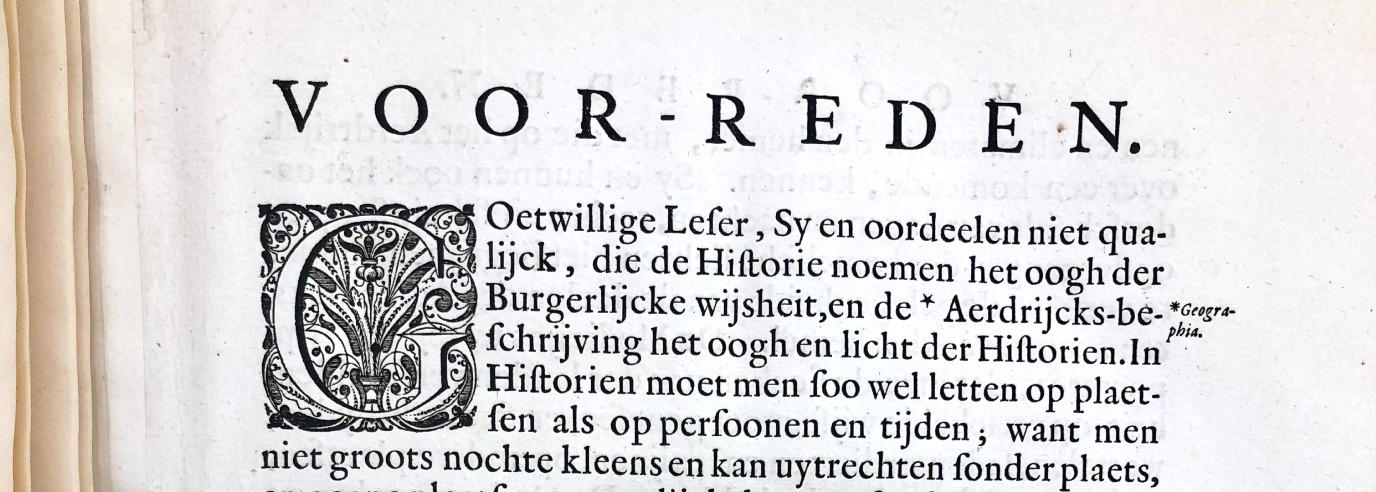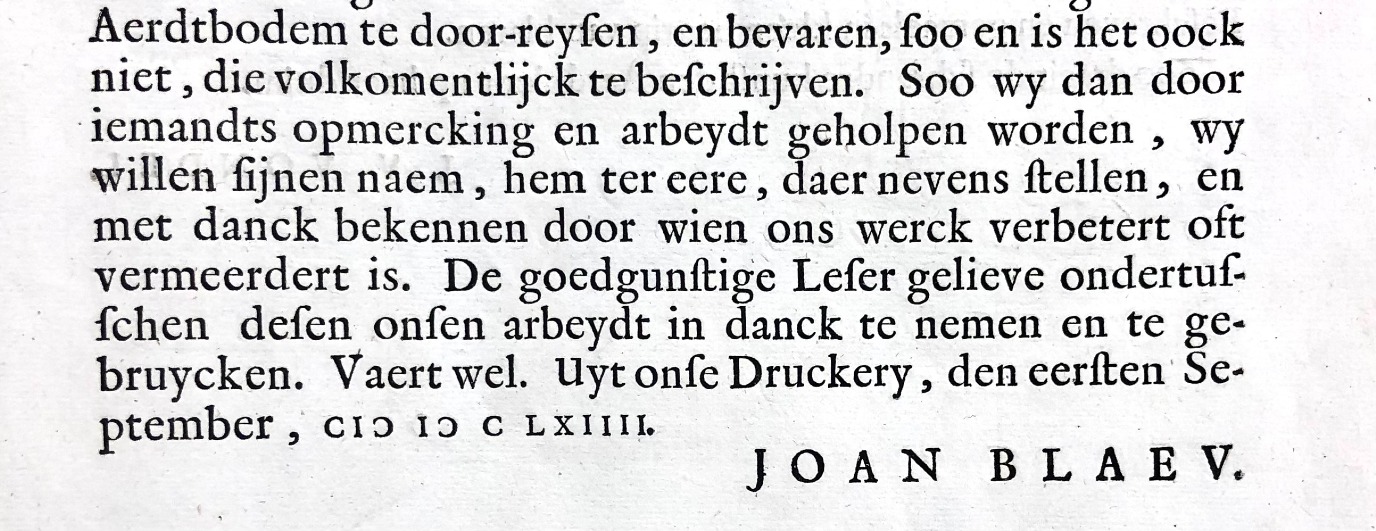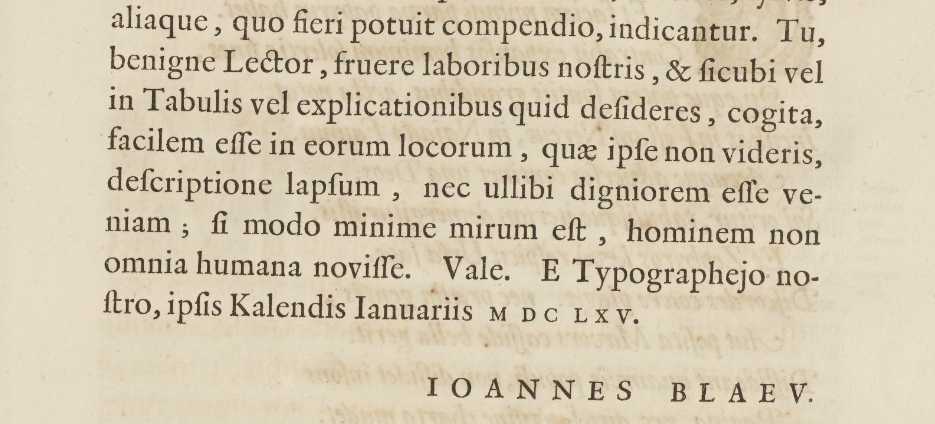Epilogue
Adrie van der Laan & Evert Jan Reker
Joan Blaeu’s Atlas Maior was published in Latin in 1662. It was subsequently issued with Dutch, French, German, and Spanish texts. The Dutch edition was published in 1664. This exhibition covers the Dutch texts in the Atlas Maior, which Blaeu begins with two introductory texts, i.e. a word ‘aen den leser’ [to the reader] and a ‘Voor-reden’ [preface]. His first Latin edition has the same texts (Lector benevole and Candido lectori, respectively), as well as a dedication to Leopold I, Holy Roman Emperor. In these introductory sections, Blaeu clarifies a number of aspects. In his word to the reader, he states that his Atlas is essential in gaining knowledge of all lands and seas: ‘geheel noodigh tot onderrichting der selve’.

The beginning of Blaeu’s Dutch preface to the Reader (dated September 1, 1664)
Blaeu also explicitly addresses his Christian and Eurocentric perspective. To him, the superiority of Christianity and European culture goes without saying. His Atlas shows the world, and that world in all its manifestations reflects the majestic glory of the Christian God as its creator. This is where Blaeu shows himself to be a Dutch man of his time. In the seventeenth century, the concept of the Book of Nature was gaining traction: the belief that nature was the physical manifestation of God’s word. The first manifestation of the word of God was, of course, the book, i.e. the Bible — hence the term Book of Nature.
In his dedication to Leopold I (dated 9 June 1662), Blaeu wrote that Europe was superior to the rest of the world, since Europe was the source of all types of studies and arts, both liberal and mechanical: excellentissimae universi orbis Europae praeeminentia … cuius velut ex uberrimo fonte omnia studiorum artiumque tum liberalium tum mechanicarum genera emanarunt. With Europe’s weapons, institutions, and trade, the fiercest peoples (ferocissimae gentes) are tamed, assimilated into society, and taught with any means required (!) to live more civilized lives (ad cultiorem vitam), Blaeu writes.

Blaeu’s final words to the reader in his Dutch preface dated September 1, 1664
The dedication to Leopold I is followed by a preface addressed to candid (candidus) readers. Blaeu valorizes his Atlas by stressing to the reader that ‘het is oock onmogelijck dat iemandt iets, van ’t gene in sijn vaderlant niet groeit, soude kunnen bekomen uyt verre-gelegen landen, sonder kennisse der selve [geographical knowledge is essential for bringing to us from faraway lands items that our own country does not produce]. He goes on to write: ‘Dit leert de Aerdtrijcks-beschrijving: soo dat dese wetenschap schijnt den wegh te banen tot eere, geluck, en nut der menschen’ [This is what Geography teaches us: so that this science will pave the way for the honour, happiness, and benefit of people]. Blaeu also calls upon everyone who believes that the description of their own region is inadequate or incomplete to send him maps, observations, and descriptions (tabulas, observationes ac descriptiones) ‘en soo te helpen bouwen tot de volmaecktheydt der Geographie’ [and so to contribute to the perfection of Geography]. Blaeu claims it is impossible for one person to produce a perfect atlas: ‘Want gelijck het een eenigh menschen werck niet en is den geheelen Aerdtbodem te door-reysen, en bevaren, soo en is het oock niet, die volkomentlijck te beschrijven’ [Just like one person cannot travel the entire Earth, it is impossible for one to describe all of it].

Blaeu’s final words in his Latin preface to “the honest reader” dated January 1, 1665. He states that his maps and descriptions are not based on his own observations.
The Dutch version does not include the final sentences of the Latin preface, where Blaeu states that the descriptions accompanying the maps differ in length and serve to indicate as concisely as possible for each region the boundaries, the nature of the soil, the customs of the people, rulers, rivers, mountains, forests, and all (regionis cujusque termini, soli indoles, populi mores, Principes, flumina, montes, sylvae, aliaque). Finally, he asks readers to forgive him for any errors in the maps or texts, requesting them to bear in mind that a mistake is easily made when describing a place one has never seen (cogita facilem esse in eorum locorum quae ipse non videris descriptione lapsum). This confirms that Blaeu did not venture into the world himself, but relied on others for his information. As the students’ analyses show, these others all shared Blaeu’s perspective.
Latin edition: The copy of the National Library of Scotland (Edinburgh)
